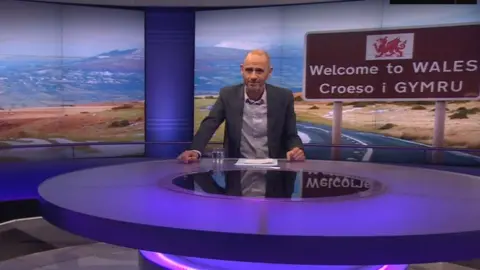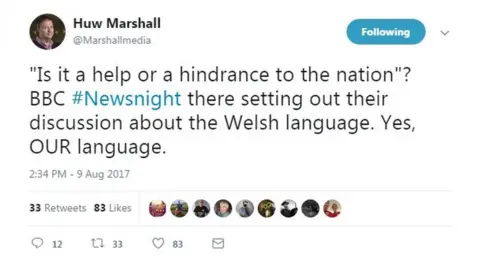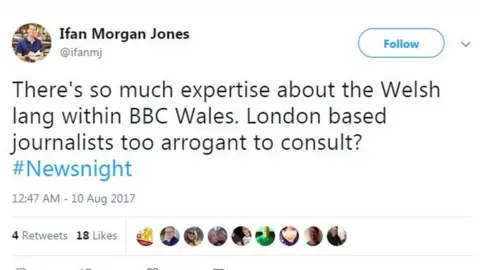BBC 'regrets' Newsnight's Welsh language debate
 BBC
BBCThe BBC has said it "regrets" an item on its Newsnight programme that asked whether the Welsh language was a "help or hindrance to the nation".
The broadcaster had been urged to apologise after Wednesday's programme.
Welsh Language Minister Alun Davies said the BBC had a "cultural problem" in London and a "serious question" needed to be asked.
Campaigners want an independent review to look at all BBC content containing a reference to the Welsh language.
A BBC spokesman said: "Whilst different perspectives were included in this item on the Welsh language, the discussion of such an important subject would have benefited from more thorough analysis and debate.
"We regret that, but believe it was important to look at this topic and we will do so again in the future."
But Mr Davies said: "They (the BBC) don't understand what the UK is, they don't know what the culture of the UK is and they don't understand Wales.
"This problem goes beyond Newsnight, last night's Newsnight reflected the problem. But I believe the BBC's problem goes further regarding the BBC in London's editorial values.
"It's a very serious question for the BBC."
He added: "Can you imagine the programme asking if the first language of any other group or nation was a hindrance?
"The tone was as if the Welsh language had to justify its own existence.
"Newsnight seemed to have no knowledge of the fact that Welsh is the first language of many people in Wales and all those who do speak Welsh also speak English.

"Surely a programme such as Newsnight could have at least found a Welsh speaker to talk about the language, someone with an insight into the language and how it is used everyday.
"Wales, only two hours from London, seems to have been treated like a nation far away about whom Newsnight knows little. Newsnight should apologise and offer viewers the informed, considered look at the Welsh language that they deserve."
Campaigners took to social media to criticise the show's choice of guests on the debate which followed the Welsh Government's decision to scrap the Welsh language commissioner role.
Newsnight introduced their report with the question: "Is the Welsh language a help or hindrance to the nation?"
It had author and columnist Julian Ruck arguing against the amount of money being spent on Welsh language promotion.
Ruth Dawson, Wales editor of an independent news and commentary website, The Conversation, gave the opposing point of view.
However critics have pointed out neither guests were Welsh speakers.
Following the report, calls for a review to establish "if there is an issue with regards how the Welsh language is portrayed and to assess what editorial systems are in place to ensure editorial fairness" were made and the petition set up.
About 1,500 people had signed the petition in the first 12 hours.
Huw Marshall, who started the petition, said the Newsnight item was "shocking for a number of reasons" and said the way the language was portrayed by the BBC centrally was "happening on a regular basis."
 Twitter
TwitterDuring the debate, Ms Dawson said: "In an ideal world, everyone would just be left to their own devices and pick up Welsh naturally.
"I had Welsh language education in school but the fact of the matter is I didn't pick up enough of it, my education wasn't good enough. I think there needs to be a bigger push to make sure more people are learning the language and using it every day."
Mr Ruck replied: "You can go to a Welsh medium school, come out of it and you cannot speak Welsh. What's the point in all of the money? It's nonsense.
"S4C is down, Radio Cymru is down, the Census of 2011 is down, all of them are down. All this money they're pumping into the language is not making more people speak Welsh."
In an interview on BBC Radio Cymru's Post Cyntaf programme on Thursday, Richard Wyn Jones, professor of Welsh politics at Cardiff University, said the Newsnight item was "insulting".
"I would like to say I'm surprised, but I'm not unfortunately," he said.
"We have become accustomed with this kind of attitude from the media in London."
Carl Morris, from Welsh language campaign group Cymdeithas yr Iaith told BBC Radio Wales: "The kind of conversations we need to be having need to be a lot more subtle and sophisticated about the Welsh Government policy, about broadcasting and whether or not the BBC and big media organisations like Sky are actually serving us in Wales and our needs in Wales."

BBC Wales arts and media correspondent Huw Thomas
How Wales is portrayed by the BBC was already a hot topic before Newsnight aired its contentious debate.
In the hours before its broadcast, a panel of industry experts at the National Eisteddfod had debated the need to improve the way Wales and the Welsh language is covered by UK-wide television programmes.
But while the focus had been on the positive steps being taken by the BBC to improve its coverage, much of the goodwill seemed to unravel when the Newsnight titles rolled.
The social media reaction has been furious, a petition is fast gathering signatures, and politicians are calling for apologies.
But many questions remain, among them: Why begin with a headline that talked of the "hindrance" of the language? Why cast two guests who do not speak Welsh to debate the merits of the language?
And with the BBC currently operating its largest outside broadcast after Wimbledon and Glastonbury at the eisteddfod, why did Newsnight not use this platform and its resources to conduct a more considered discussion?
